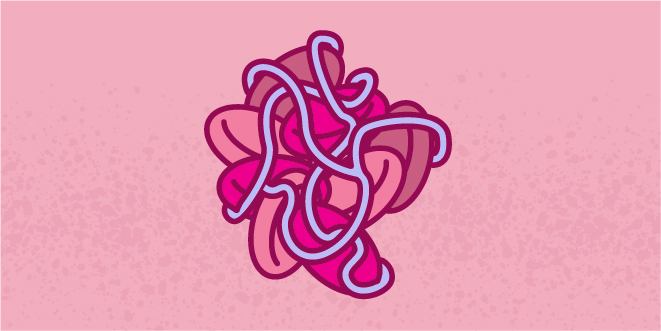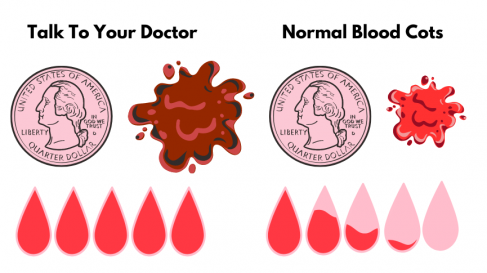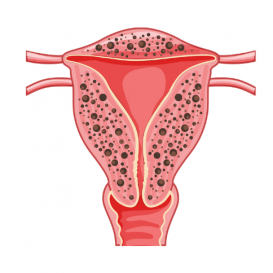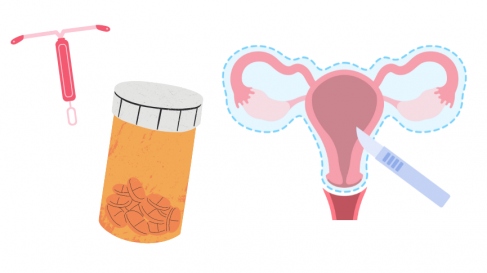Are Menstrual Clots Normal?

Despite having a period month-in and month-out, there are still some questions that remain unanswered about this time of the month.
This could partly be because one didn’t receive adequate (or any) education regarding the menstrual cycle at home or at school, or because one notices something during “that time of the month” that is out of the ordinary or maybe even frightening.
Like menstrual clots – Are they normal and why do they happen?
What are menstrual clots?
During your monthly period, your uterine lining sheds which means that blood expels through the vagina.
This lining is made up of blood, blood byproducts, mucus, and tissue.
This blood and tissue is fairly thick, so the body releases anticoagulants which help thin the blood to make it easier to pass.
But, if your blood flow outpaces your body’s ability to produce anticoagulants, menstrual clots occur.
As Salena Zanotti, MD, says:
“Blood clots will form anytime you have a certain amount of blood that just sits there. Blood clots are supposed to happen to some degree, like when you cut yourself. But with period clots, what happens is if you’re having a good amount of bleeding, it collects inside your uterus and as it sits there it will make a clot.”
If you’re someone who experiences menstrual clots, seeing a specialist is a good idea if:
- You pass multiple blood clots that are bigger than a quarter
- You have heavy menstrual bleeding (you change your tampon or pad every two hours or less) for several hours
“Normal” blood clots are usually:
- Smaller than a quarter
- Infrequent
- Happen near the beginning of your period
- Bright or dark red in appearance
Underlying causes of menstrual clots
Now that we know what happens inside of the body when menstrual clots form and are released, are there any underlying causes to be aware of?
Indeed, there are some physical and hormonal factors that can affect your blood flow and the formation of blood clots.
Uterine obstructions
If one has a condition that enlarges the uterus, additional pressure could be placed on the uterine wall. This could lead to heavier bleeding and menstrual clots.
Obstructions can also interfere with the uterus’s ability to contract. That means that it’ll take longer for the blood to exit the vagina so it could start to pool inside of the uterine cavity and form clots.
An imbalance of hormones
Throughout one’s menstrual cycle, hormones are continuously changing, rising and falling. This does not mean that there is an imbalance however. In fact, this combination of hormonal changes make for the perfect condition for conception.
But if someone suffers from an imbalance of hormones (perhaps from conditions such as perimenopause, stress, significant weight loss or gain), then there could be a change in how much blood is expelled, and if it forms clots or not.
Adenomyosis
This condition causes one’s uterus lining to grow into the muscular wall of the uterus. And when it happens, the uterus can grow up to two to three times its normal size.
During adenomyosis, the endometrial lining and the uterine wall can be much thicker than normal. This, in turn, can result in heavier periods and blood clotting.
Enlarged Uterus
If one has a bigger uterus (oftentime after pregnancy), it has a bigger space for blood to pool before it is expelled.
This means that blood clots may form as the blood sits inside of the uterus, waiting to exit the body.
Miscarriage
In the unfortunate event of a miscarriage, it is common to expel a lot of blood and blood clots.
But if a person does not know that they’re pregnant, they may just think it is a heavy period.
Thyroid issues
Your thyroid is a gland in your neck, and it’s responsible for producing and distributing hormones. So, if one is experiencing a thyroid condition, it may mean chaos for their menstrual cycle.
Some thyroid conditions include hyperthyroidism and hypothyroidism (when the body produces too much or too little of the thyroid hormone).
Endometriosis
Endometriosis affects around 10% of women around the world. It’s a condition that causes the tissue of the uterine lining to grow outside of the uterus.
If one is living with endometriosis, they may experience heavier and more painful periods accompanied with blood clots.
How to diagnose menstrual clots
If you are experiencing menstrual clots frequently that are bigger than a quarter, the first step would be to visit your healthcare provider.
They will ask you several questions about your cycle as well as things that may affect your cycle.
For example, they may ask you if you’ve ever had pelvic surgeries, if you use birth control, or if you’ve ever been pregnant.
After this, they may run some blood tests to look for any hormonal imbalances. And/or they may conduct an imaging test (such as an MRI or ultrasound).
How to treat menstrual clots
There are some solutions which may be effective in reducing or stopping menstrual clots:
- Hormonal contraceptives: If one is on hormonal contraceptives, the growth of the uterine lining could be inhibited. An intrauterine device (IUD), for example, can reduce the amount of period blood by up to 90%. And the birth control pill could reduce it by up to 50%.
- Medication: Medicine that belongs to the class of drugs known as antifibrinolytics could have a positive effect when it comes to menstrual clotting. A healthcare provider might also suggest that you take nonsteroidal anti-inflammatory drugs, which can aid in less bleeding and more comfort.
- Surgery: A dilation and curettage (D and C) procedure is sometimes done after child birth or a miscarriage. It can also be done as a means to discover the cause of heavy menstruation and blood clots. This procedure won’t cure heavy bleeding, but it could provide less bleeding for a few months. Another surgery some may opt for is a hysterectomy. This is when the uterus is removed, and one will not be able to conceive nor will they have any monthly periods.
So, while menstrual clots can be a cause for concern, there are a few ways in which a professional could help.
The bottom line? If you start to notice that your periods are getting much heavier or that you’re experiencing (more) big blood clots, seeking medical treatment is advised.

Helena is a sex-positive South African writer who loves swimming in the ocean under the full moon and cheesy 90’s pop. She’s currently living her best life in Porto, Portugal after scouring different continents to find her happy place.






